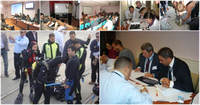REMPEC organized a Regional Training Course on Port Biological Baseline Survey (PBBS) in Turkey – Oct 21, 2008
A Regional Training Course on Port Biological Baseline Survey (PBBS) was organised by REMPEC, in cooperation with the Under-Secretariat for Maritime Affairs of the Republic of Turkey and hosted by the Scientific and Technological Research Council of Turkey (TÜBITAK) of the Marmara Research Centre (MRC).
The Training Course, which was delivered within the framework of the GEF/ UNDP / IMO GloBallast Partnerships Project and financed by the EU-funded MEDA Regional Project “Euromed Cooperation on Maritime Safety and Prevention of Pollution from Ships – SAFEMED” (MED 2005/109-573), was conducted over a duration of four days and included lectures as well as a field training.
The first two days of the Training Course were dedicated to theoretical and practical training, including background presentations and hands on training with sampling equipment. This part of the Course covered all aspects of port surveys, from planning and funding to taxonomy, collection, housing and final reporting, providing the necessary knowledge to plan for a port survey in their homeport.
The third day of the Training Course consisted of field sampling activities, which took place in the Yenikoy Terminal, located in the Izmit Bay, with all trainees having an opportunity to observe and participate in the field sampling activities. A team of six divers carried out the sampling, and the samples were then taken to the TUBITAK marine laboratory for sorting and further analysis. The fourth day was dedicated to the reports of the groups and summary and conclusion of the Training Course.
The Training Course was instructed by two experts from the National Institute of Water and Atmospheric Research (NIWA), New Zealand. IMO-GloBallast provided backstopping support, and lecturers also included Mediterranean experts from Israel and Turkey, who provided an overview of the situation regarding the introduction in the region of harmful pathogens invasive species. The Regional Activity Centre for the Specially Protected Areas (RAC/SPA) was also associated to the Course.
A total of thirty-eight representatives of fourteen Mediterranean countries have participated in the Training Course.


